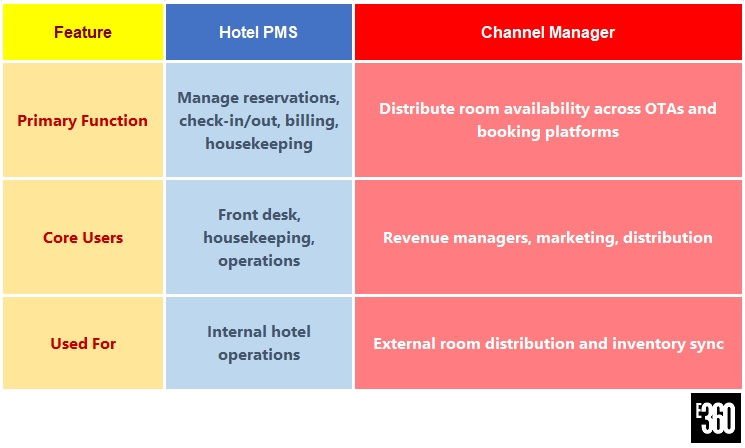When running a hotel, you’ll often hear two key terms: channel manager and PMS (property management system). While they sound similar — and often work together — they serve very different purposes.
In this guide, we’ll break down the key differences between a channel manager and PMS, when you need one (or both), and how they impact your hotel’s operations and revenue.

Summary Table: PMS vs Channel Manager
Here’s a quick snapshot of how a PMS compares to a channel manager at a glance:
| Feature | Hotel PMS | Channel Manager |
|---|---|---|
| Primary Function | Manage reservations, check-in/out, billing, housekeeping | Distribute room availability across OTAs and booking platforms |
| Core Users | Front desk, housekeeping, operations | Revenue managers, marketing, distribution |
| Used For | Internal hotel operations | External room distribution and inventory sync |
What Is a Hotel PMS?
A hotel PMS (Property Management System) is software that helps manage your hotel’s day-to-day operations — from reservations to check-ins, billing, housekeeping, and guest profiles.
It acts as the operational hub of your property.
- Manage room reservations and availability
- Handle guest check-ins and check-outs
- Process payments and generate invoices
- Track housekeeping and maintenance
- Store guest profiles and preferences
- Integrate with POS, channel managers, and more
Want a deeper dive? 👉 Check our comparison of the best hotel PMS systems in 2025
What Is a Channel Manager?
A channel manager is hotel software that automatically syncs your room availability, rates, and bookings across multiple online travel agencies (OTAs) — like Booking.com, Expedia, Airbnb, and others.
It prevents overbookings and ensures your listings stay accurate in real-time.
- Sync room inventory across OTAs and direct booking engines
- Prevent double bookings and inventory errors
- Automate rate and availability updates
- Increase visibility on multiple platforms
- Integrate with PMS for real-time data flow
Want to learn more? 👉 What is a hotel channel manager?
Channel Management Strategies 👉 Increase Hotel Revenue with Channel Management Strategies
PMS vs Channel Manager – Key Differences
While both tools are essential for running a hotel efficiently, a PMS and channel manager handle very different tasks. Here’s how they compare — and why most hotels need both working together.
| Feature | PMS | Channel Manager |
|---|---|---|
| Core Purpose | Manage internal hotel operations | Distribute room inventory to OTAs |
| Used By | Front desk, operations, finance | Revenue managers, distribution, marketing |
| Key Features | Check-in/out, housekeeping, billing | OTA sync, rate parity, real-time updates |
| Integrates With | Channel managers, POS, CRM | PMS, booking engines, rate shoppers |
| Main Focus | In-house guest experience | External visibility and sales |
In short, your PMS runs the operations, while your channel manager handles the distribution — and they work best when connected.
Do You Need Both a PMS and Channel Manager?
In most cases, yes — hotels need both a PMS and a channel manager. These two systems work best when integrated, helping you run smooth operations internally while maximizing bookings externally.
Without a channel manager, you risk overbookings and manual updates across OTAs. Without a PMS, you’ll struggle to manage guest check-ins, billing, and housekeeping.
- You list your property on 2+ OTAs (e.g. Booking.com, Airbnb)
- You take both direct and third-party bookings
- You want to avoid overbookings and rate discrepancies
- You need real-time availability updates across platforms
- You run a small, mid-size, or boutique hotel with growing demand
Looking for a system that offers both PMS and channel manager features in one? Let’s explore the best combos below.
Best PMS + Channel Manager Combos for Hotels
Some hotel management platforms offer both PMS and channel manager tools in one system — making setup easier, integrations smoother, and operations more efficient. Here are some of the top all-in-one solutions hoteliers love in 2025:
| Platform | Best For | PMS Included | Channel Manager Included |
|---|---|---|---|
| Cloudbeds | Mid-sized & growing hotels | ✅ Yes | ✅ Yes |
| Little Hotelier | Small hotels & B&Bs | ✅ Yes | ✅ Yes |
| RoomRaccoon | Boutique hotels | ✅ Yes | ✅ Yes |
| eZee Absolute | Budget hotels | ✅ Yes | ✅ Yes |
| RMS Cloud | Resorts & multi-property groups | ✅ Yes | ✅ Yes |
Want more options? 👉 Compare the best hotel PMS platforms for 2025
Final Verdict: PMS vs Channel Manager
A PMS handles your hotel’s internal operations — like guest check-in, billing, and housekeeping — while a channel manager focuses on external visibility and OTA distribution.
Most hotels, even small ones, benefit from using both together — especially when integrated into one seamless platform.
Whether you’re just starting out or scaling your property, investing in the right systems can boost efficiency, avoid overbookings, and increase revenue across channels.
👉 Explore our top picks for hotel PMS systems in 2025
👉 Learn more from our hotel technology glossary
Frequently Asked Questions (FAQs)
What’s the difference between a PMS and a channel manager?
A PMS manages hotel operations like bookings, billing, and housekeeping. A channel manager syncs your room availability and rates across online travel platforms.
Can I use a channel manager without a PMS?
It’s possible, but not ideal. A PMS automates key operational tasks, and without it, you’d have to manage guest info and check-ins manually.
Do I need both a PMS and a channel manager?
Yes — most hotels use both. The PMS runs internal operations, while the channel manager handles external room distribution. Together, they reduce overbookings and save time.
Is Cloudbeds a PMS or a channel manager?
Cloudbeds is an all-in-one system that includes both a property management system (PMS) and a channel manager, plus other tools like booking engines and payment processing.

